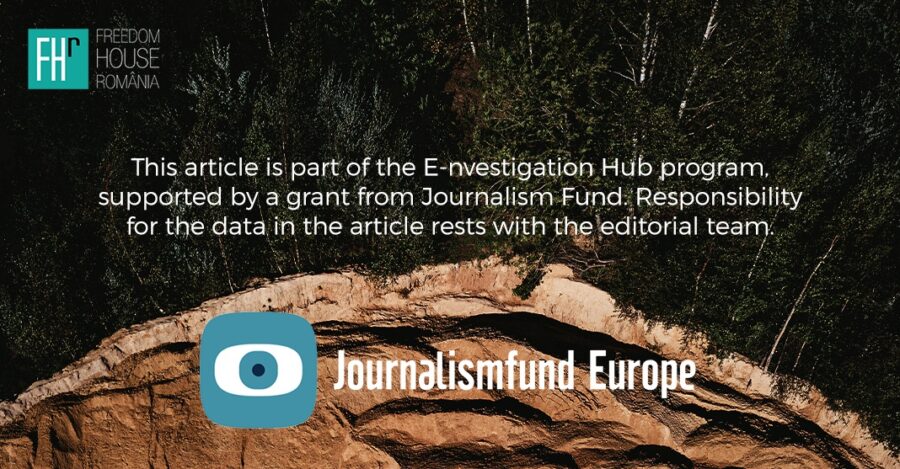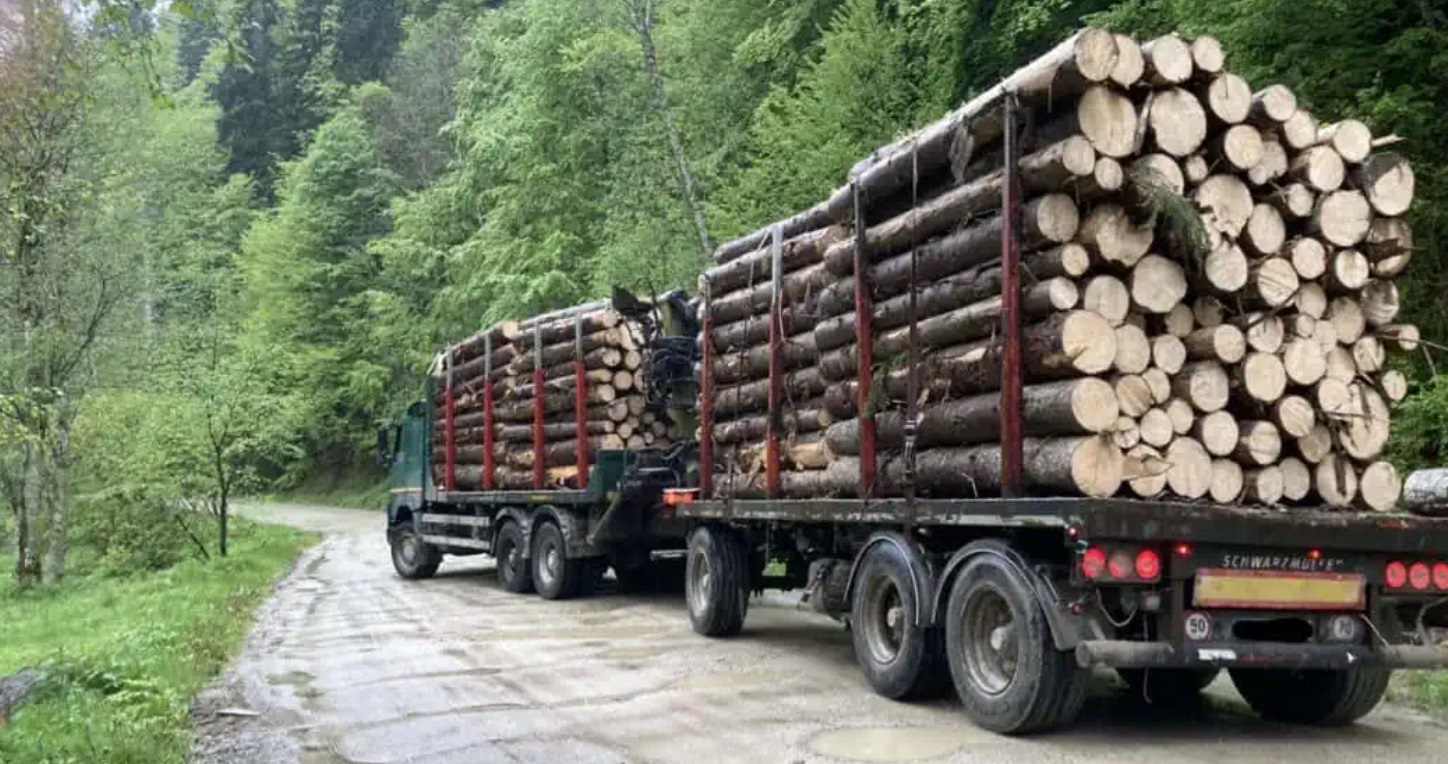Many prosecutors from small local offices handling environmental cases do not apply the law consistently when it comes to seizing trucks used for transporting illegal timber. While some investigators carry out their duties exemplary, others fail to understand the gravity of the situation or suddenly become lenient, returning the trucks to their owners. The leadership of the General Prosecutor’s Office does not even keep track of these cases.
In April 2024, as the Senate debated a series of amendments to the Forest Code—amendments required by the National Recovery and Resilience Plan (PNRR)—the most heated dispute between politicians and civil society centered around the article mandating the confiscation of vehicles used to transport illegal timber.
Currently, the law is stalled in the Chamber of Deputies.
In spring, while the Ministry of Justice and wood industry associations argued that vehicles should only be confiscated at the end of the legal process—citing a provision from the Criminal Code—environmental activists called for the immediate seizure of trucks, a measure that was introduced four years ago in the Forest Code and has shown results in certain areas.
Inconsistent practice
Why do we say only in certain areas?
Because in Romania, there are prosecutors who apply the law and others who interpret it in ways that avoid enforcement.
When we raised the issue of trucks being impounded after being caught red-handed transporting wood without proper documentation, the responses from various prosecutor’s offices were contradictory.
This inconsistency demonstrates that, at a national level, there is no coherent and uniform judicial practice when a vehicle carrying illegal timber is detected on the road.
The greatest frustration for environmental activists arises when the police seize a truck, only for the prosecutor to return it to the owner, who then sends it back to the forest for another illegal timber transport.
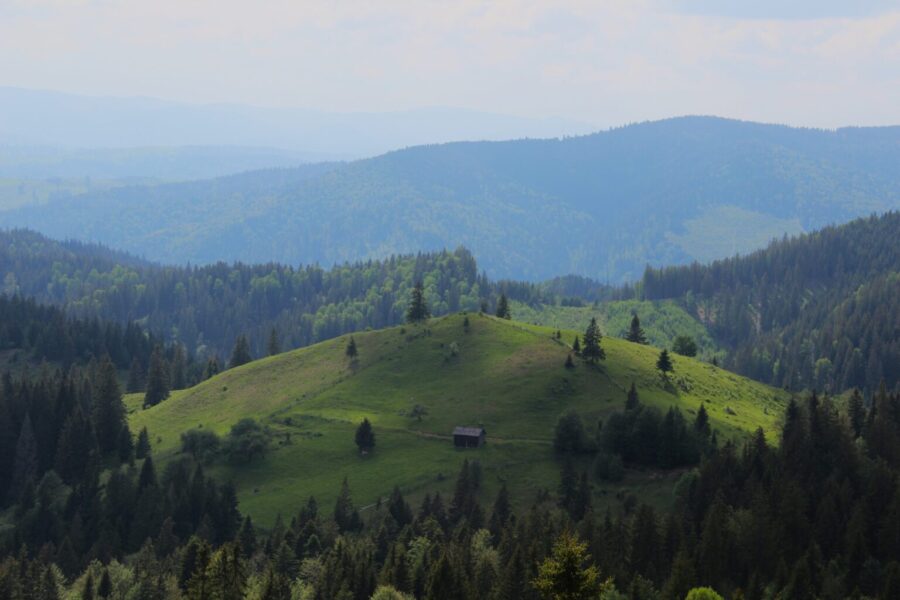
Ciumârna – Palma, Suceava County, 2020 (Photo: Virgil Burlă)
Environmental advocates closely monitor and identify trucks carrying illegal timber. They check the license plate numbers of trucks or trailers on www.inspectorulpadurii.ro, spot irregularities and then call 112.
A police unit is dispatched to track down the truck and, if they are fortunate, intercept it before it reaches its destination. Once the truck arrives at a factory, the police cannot enter to conduct checks without a search warrant.
If the environmental activists’ claims are verified, the police draft a report to unload and confiscate the timber, followed by the impoundment of the vehicle.
Often, the police announces in official statements that these trucks have been confiscated.
Suspicious reversals
The decision to impound a vehicle must be confirmed by a prosecutor. This is where things start to get complicated.
Some prosecutors choose to impound trucks involved in illegal transports. Others do not enforce this measure, and some apply it temporarily, only to return the vehicles to their owners a few days later, citing that the value of the confiscated timber is disproportionate to the market value of the truck.
Naturally, this raises suspicions of corruption among the judiciary, though no case has been proven so far.
I asked the General Prosecutor’s Office and the chief prosecutors of the Prosecutor’s Offices attached to the Courts of Appeal across the country how many trucks confiscated in 2023 were returned to their owners by the prosecutors handling criminal cases for illegal timber transport.
Authorities lack data on the phenomenon
Despite the Public Ministry being a hierarchical structure—with the General Prosecutor at the top, followed by 16 chief prosecutors of the Prosecutor’s Offices attached to the Courts of Appeal, who, in turn, oversee the Prosecutor’s Offices attached to the tribunals and district courts—the chief prosecutors of the Courts of Appeal are not aware of what is happening within the subordinate structures.
Nor does the General Prosecutor’s Office (PG), which supervises all prosecutor’s offices across the country, including those attached to the Courts of Appeal, have any record of these cases.
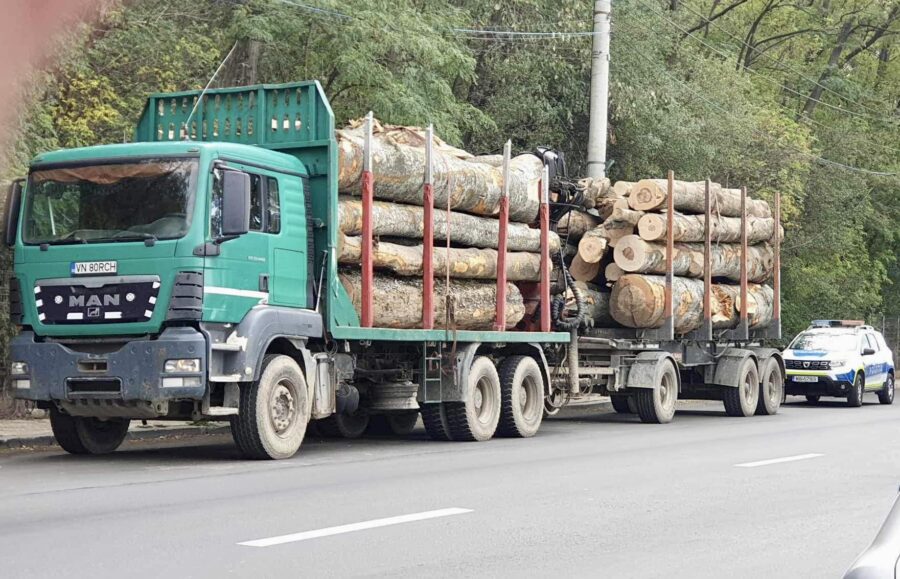
A truck registered in Vrancea, confiscated by authorities, June 2024. (Photo: Facebook Daniel Bodnar)
The PG informed us that “in 2023, within the Prosecutor’s Office attached to the High Court of Cassation and Justice, as an independent unit, no such case was registered. On the other hand, in relation to the hierarchically subordinate units—Prosecutor’s Offices attached to the Courts of Appeal, Prosecutor’s Offices attached to the tribunals, and Prosecutor’s Offices attached to the district courts—in the context of the competencies established by the organizational law and the Internal Order Regulations, the Prosecutor’s Office attached to the High Court of Cassation and Justice does not process this category of data”.
In other words, the General Prosecutor does not have any record, not even for the annual report of the Public Ministry, of the number of trucks that were confiscated and then returned to their owners in environmental cases under investigation.
Data kept secret
The chiefs of the Prosecutor’s Offices attached to the Suceava and Bacău Courts of Appeal, Prosecutors General Tudor Andrei Blînda and Nicolae Cristian Ursulescu, informed us that it is not our—journalists’—concern how many trucks have been returned:
“We inform you that the requested aspects are excluded from public access to information. In this context, the procedural-criminal provisions regarding the framework and eligibility of individuals to obtain data related to a criminal case apply, given the principle of non-publicity governing criminal investigations”, the two chief prosecutors stated.
It should be noted that the most illegal timber transports detected by environmental activists occur in the jurisdictions of the Suceava and Bacău Courts of Appeal.
The Prosecutor’s Office attached to the Alba Court of Appeal acted similarly. In a handwritten letter, the chief prosecutor of Alba states that “your request does not fall into the category of public interest information and is excluded from public access”. The position of Prosecutor General at the Alba Court of Appeal is held by Elena Angelica Moldovan.
Complete lack of interest
The Oradea Court of Appeal Prosecutor’s Office (PCA Oradea) stated that it has not had any cases involving the confiscation of trucks and that it is unaware of whether subordinate units have encountered such cases.
“We inform you that at the level of the Prosecutor’s Office attached to the Oradea Court of Appeal, no vehicles of the type you referred to have been impounded, and we do not have centralized information regarding the other prosecutor’s offices within the jurisdiction of the Oradea Court of Appeal”, stated PCA Oradea in their response.
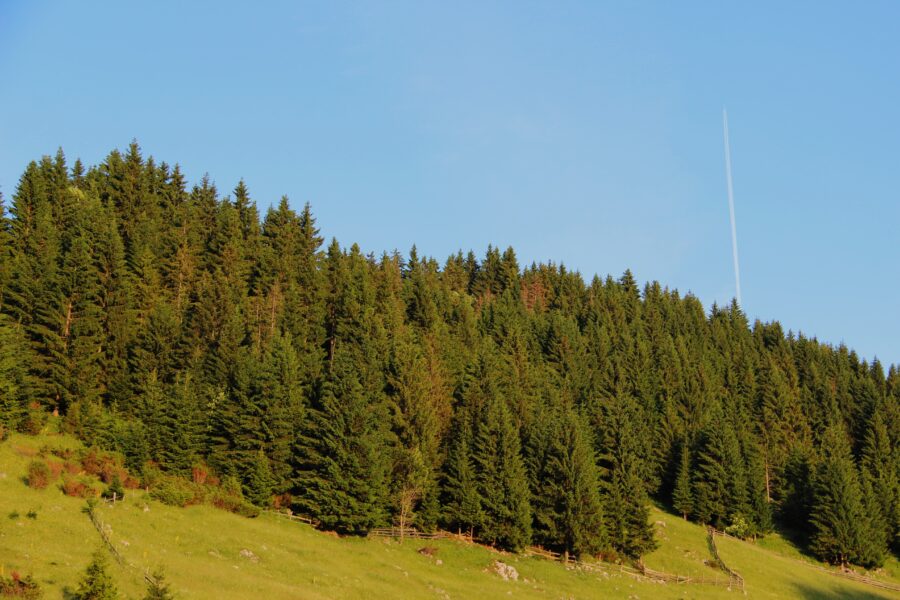
Fundata, Brașov County – 2020
Similarly, the Prosecutor’s Office attached to the Bucharest Court of Appeal (PCA Bucharest) reported no such cases, redirecting our request to the subordinate prosecutor’s offices for a response.
- The Prosecutor’s Office attached to the Timișoara Court of Appeal (PCA Timișoara) informed us that “no cases have been identified involving environmental crimes where prosecutors from the Prosecutor’s Office attached to the Timișoara Court of Appeal ordered the impoundment and subsequent return to the owners of vehicles transporting timber without authorization or exceeding 10 cubic meters per transport in 2023”.
- PCA Constanța reviewed the situation for the counties of Constanța and Tulcea, including subordinate units, and communicated that they found no cases where trucks transporting illegal timber were confiscated and then returned to the owner.
- Similarly, environmental cases handled by the Prosecutor’s Offices attached to the Cluj, Craiova, Galați, Iași, and Brașov Courts of Appeal, involving the confiscation and subsequent return of trucks, have not been resolved by these offices. However, this statistic does not necessarily apply to the subordinate prosecutor’s offices.
- PCA Ploiești, PCA Târgu Mureș, and PCA Pitești did not respond to our request, with the deadline established by Law 544/2001 being grossly exceeded; the request was made on April 9.
Given that there are 219 prosecutor’s offices in Romania, each with its own chief, we asked environmental activists where they encountered the most significant issues with this inconsistent prosecutorial practice in cases involving illegal timber theft.
Thus, the most cases were reported in Reghin, Târgu Mureș, Odorheiu Secuiesc, Brașov, Neamț, Focșani, Roman, Bacău, Rădăuți, Fălticeni, Harghita, Covasna, and Bistrița Năsăud.
Trucks returned with a wink and a nod
We asked prosecutors from these locations how many confiscated trucks were returned to their owners this year.
In 2024, the Prosecutor’s Office attached to the Reghin District Court reported that it impounded three trucks transporting timber illegally.
Two of these trucks were returned to their owners, with the condition that they be kept until a final decision is made, while one truck was seized, with the measure upheld by a judge who confirmed the investigators’ decision was correct.
The Prosecutor’s Office attached to the Târgu Mureș District Court informed us that this year they had one case where a truck was impounded, only for the case prosecutor to return it to the owner pending the outcome of the investigation.
In Odorheiu Secuiesc, no trucks have been impounded this year.
The Prosecutor’s Office attached to the Neamț Tribunal, as well as the prosecutors from Roman and Bacău, did not respond to the inquiry.
Prosecutors from Rădăuți reported that “between January 1 and June 30, 2024, four vehicles (including trucks, trailers, etc.) were impounded in three criminal cases involving violations of Law 46/2008, with three of these vehicles being returned (one case being closed).”
In other words, all 4 vehicles are back on the roads and continue to transport timber, despite being caught red-handed in illegal activities.
Prosecutors from Fălticeni did not respond to the request, while investigators from Covasna stated that they have not confiscated any trucks in the environmental cases they are currently handling.
The sticklers of Bistrița Năsăud
The most brazen response came from the Prosecutor’s Office attached to the Bistrița Năsăud District Court, where most environmental activists’ complaints about illegal timber transport are deliberately ignored by prosecutors.
Disregarding Law 544/2001 on free access to public information, which any citizen in the country can invoke, the prosecutor’s office responded to our request with a single line:
„Considering your request, please provide proof of your status as a journalist”. This prosecutor’s office is led by Prosecutor Cezar Maxim.
Environmental activists’ frustration
Daniel Bodnar is an environmental activist and leader of the group „Forest Guardians” in Suceava County.
He expresses his frustration with the negligence of prosecutors who fail to enforce the law and remain unaware of what’s happening on the ground.
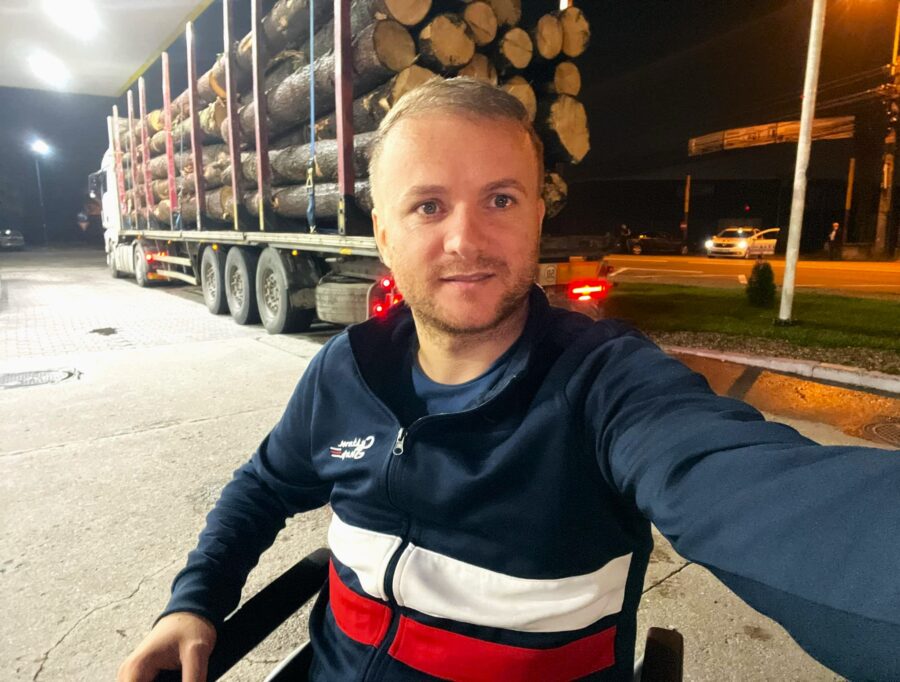
In 2021, Daniel Bodnar was the victim of a traffic accident while pursuing timber thieves (Photo: Facebook)
Of course, not all prosecutors are the same. „First of all, prosecutors refuse to get involved enough to understand this phenomenon. For example, the prosecutor from Câmpulung Moldovenesc has been a pioneer, taking actions to a new level. He has seized and kept in custody anything that raises suspicion. Some are lazy and uninterested, wanting to get rid of the case quickly. They either dismiss it swiftly or return the truck to the company with the right to use it”, Bodnar told us.
Problems in Mureș
According to Bodnar, Mureș County is the most problematic in this regard:
„We have significant issues with the prosecutor’s offices in Mureș County. It’s a county with a bad reputation for this. Everything that is confiscated is returned and often only the semi-trailer is seized, even though the law clearly states that all transport vehicles used in the commission of the crime are subject to confiscation. What keeps us going is that there are still some prosecutors who are interested and highly professional. We’ve had cases in Arad, Bihor, and in Suceava, in Câmpulung, that have surprised us. On the other hand, those in Fălticeni are very disinterested. All those who get their trucks back end up committing other crimes and offenses. We have many examples of this. In a way, some prosecutors become the most important tools in this fight. Although it’s a very serious issue, we must accept the reality that some are a haven for the thieves”, Bodnar added.
The pro-theft Law
The issue has also been analyzed by former senator Mihai Goțiu. He participated in Senate committees on behalf of the Society for Academic Research (SAR) and, as a co-initiator of the 2020 provision in the Forestry Code that mandated the confiscation of trucks, advocated for retaining this provision in the new law.
„Some prosecutors invoke an article from the Penal Code that states if there is a disproportion between the value of the confiscated property and the damage, the property can be returned. This damage should not only account for the value of the illegally transported timber. There are always complicities in this network of transporters, with forest rangers, control institutions, and timber processors. An organized criminal group is often formed, which leads to tax evasion, meaning the damage is much greater and prosecutors should consider this when returning the trucks”, Goțiu told us.
Nothing to interpret
He also points out that the bill was halted during the election campaign and is now stalled in the Chamber of Deputies, where we might expect surprises.
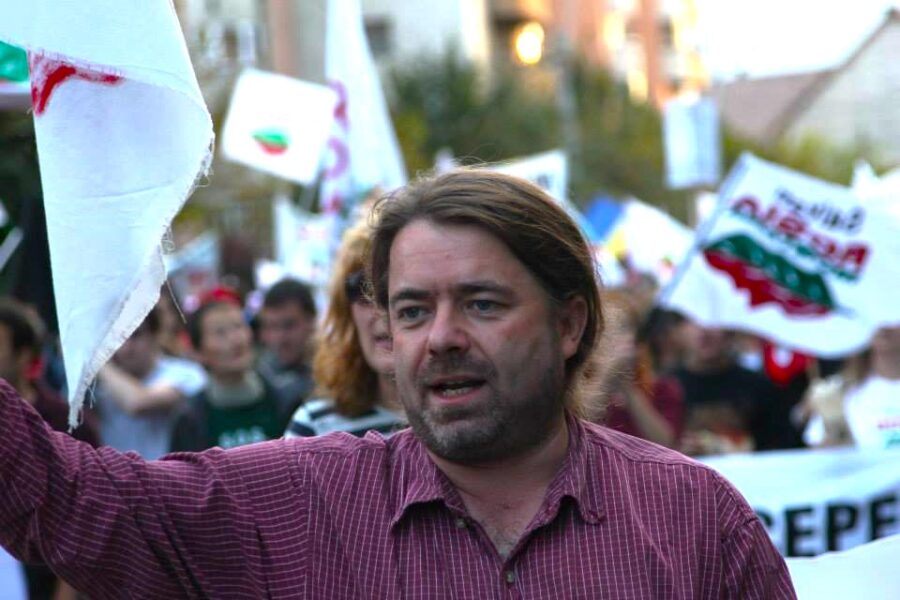
Former Senator Mihai Goțiu, 2019, during the Roșia Montană protests (Photo: Facebook)
“The Chamber of Deputies is the deciding body. There is strong lobbying from members of the Legal Committee and the Committee on Agriculture and Forestry. Trucks transporting illegal timber must continue to be confiscated, and the prosecutors’ interpretations are absurd. There is nothing to interpret in the Forestry Code. This provision must remain in the Code. There is a risk that it may not be adopted before next year. As long as there is electoral pressure on politicians, the article might remain. If it is adopted after the elections, they might prefer to forgo the PNRR funds and gut the Forestry Code”, Goțiu adds.
What the Forestry Code says
Currently, trucks are confiscated under the provisions of the 2020 Forestry Code:
„Transporting timber in quantities exceeding 10 cubic meters, with the specific transport documents required by paragraph (1), constitutes a crime and is punishable by a fine or imprisonment from 6 months to 1 year, along with the confiscation of the timber being transported. (22) The means of transport of timber and any other goods used in any way, or intended to be used in the commission of the crime specified in paragraph (21), are subject to confiscation”.
The version adopted by the Senate in April 2024 was modified to state that „Goods that have been used in any way, or intended to be used in the commission of the offenses specified in paragraphs (3)-(5), including means of transport, shall be compulsorily confiscated in kind”.
